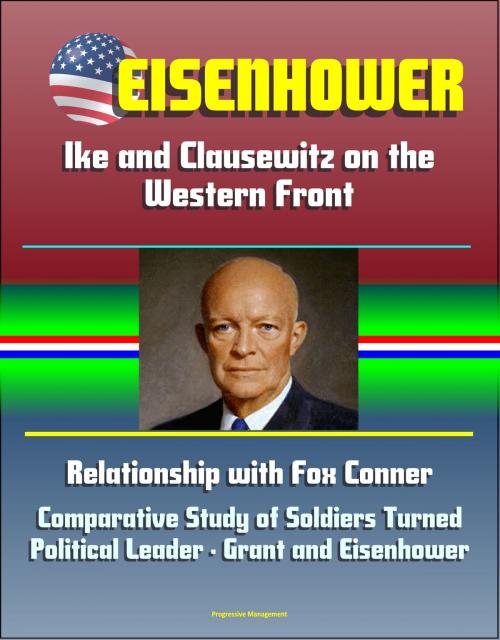Eisenhower: Ike and Clausewitz on the Western Front, Relationship with Fox Conner, Comparative Study of Soldiers Turned Political Leader - Grant and Eisenhower
Nonfiction, History, Military, World War II, Social & Cultural Studies, Political Science| Author: | Progressive Management | ISBN: | 9781370670697 |
| Publisher: | Progressive Management | Publication: | March 16, 2017 |
| Imprint: | Smashwords Edition | Language: | English |
| Author: | Progressive Management |
| ISBN: | 9781370670697 |
| Publisher: | Progressive Management |
| Publication: | March 16, 2017 |
| Imprint: | Smashwords Edition |
| Language: | English |
These reports have been professionally converted for accurate flowing-text e-book format reproduction. Contents include: World War II: Eisenhower and Clausewitz on the Western Front * The Relationship Between Fox Conner and Dwight Eisenhower * Grant and Eisenhower: A Comparative Study of the Soldier Turned Political Leader
The teacher-student relationship that Conner and Eisenhower shared is by far the most famous and most cited in the area of military mentoring. This relationship began when Eisenhower reported to Panama. Eisenhower's assignment as Conner's brigade executive officer at Camp Gaillard in Panama began a significant transition in Eisenhower's professional education. This professional development began immediately upon his arrival to Panama. Eisenhower was not a diligent student at West Point. He enjoyed poker, playing football, and often found himself in trouble. In Eisenhower's own words, "As has been noted elsewhere, I was, in matters of discipline, far from a good cadet. I didn't think of myself as either a scholar whose position would depend on the knowledge he had acquired in school, or as a military figure whose professional career might be seriously affected by his academic or disciplinary record." Conner believed differently. Conner discovered Eisenhower's distaste for military history, based on the tedious memorization requirements at West Point, and began to teach Eisenhower the implications of such history.
Eisenhower's role in World War II was truly unique. Never before had a military commander been asked to accomplish a task of such magnitude as the conquest of Western Europe with such disparate forces and with such little real authority. What is more, Eisenhower's prescribed endstate was not a negotiated peace, but the enemy's "unconditional surrender"—a term that served great rhetorical purposes, but was never defined in either military or political terms. No one prior to World War II had ever held joint command of ground, air, and naval forces. No American had ever directed the combined forces of allied nations. Contemporary coalition commands that were formed in the Pacific, Middle East, and Southwest Asia were much less complex. They were generally focused exclusively on either land or sea operations, and all were much smaller. Eisenhower's massive unified command of joint and multinational forces was unparalleled in the war by either the Allies or the Axis. It is highly doubtful that anyone other than Eisenhower could have achieved victory on the terms he did, sustaining Allied unity and resolve through four bitter campaigns, and building a level of cooperation and trust with the Soviets that allowed him to compel a simultaneous German surrender on both fronts. What is more, Eisenhower did what General George C. Marshall and Field Marshal Sir Alan Brooke, the principal candidates for his ultimate command, could not or would not have done— establish himself as a true field commander who maintained real operational control of land and air combat forces at his headquarters.
These reports have been professionally converted for accurate flowing-text e-book format reproduction. Contents include: World War II: Eisenhower and Clausewitz on the Western Front * The Relationship Between Fox Conner and Dwight Eisenhower * Grant and Eisenhower: A Comparative Study of the Soldier Turned Political Leader
The teacher-student relationship that Conner and Eisenhower shared is by far the most famous and most cited in the area of military mentoring. This relationship began when Eisenhower reported to Panama. Eisenhower's assignment as Conner's brigade executive officer at Camp Gaillard in Panama began a significant transition in Eisenhower's professional education. This professional development began immediately upon his arrival to Panama. Eisenhower was not a diligent student at West Point. He enjoyed poker, playing football, and often found himself in trouble. In Eisenhower's own words, "As has been noted elsewhere, I was, in matters of discipline, far from a good cadet. I didn't think of myself as either a scholar whose position would depend on the knowledge he had acquired in school, or as a military figure whose professional career might be seriously affected by his academic or disciplinary record." Conner believed differently. Conner discovered Eisenhower's distaste for military history, based on the tedious memorization requirements at West Point, and began to teach Eisenhower the implications of such history.
Eisenhower's role in World War II was truly unique. Never before had a military commander been asked to accomplish a task of such magnitude as the conquest of Western Europe with such disparate forces and with such little real authority. What is more, Eisenhower's prescribed endstate was not a negotiated peace, but the enemy's "unconditional surrender"—a term that served great rhetorical purposes, but was never defined in either military or political terms. No one prior to World War II had ever held joint command of ground, air, and naval forces. No American had ever directed the combined forces of allied nations. Contemporary coalition commands that were formed in the Pacific, Middle East, and Southwest Asia were much less complex. They were generally focused exclusively on either land or sea operations, and all were much smaller. Eisenhower's massive unified command of joint and multinational forces was unparalleled in the war by either the Allies or the Axis. It is highly doubtful that anyone other than Eisenhower could have achieved victory on the terms he did, sustaining Allied unity and resolve through four bitter campaigns, and building a level of cooperation and trust with the Soviets that allowed him to compel a simultaneous German surrender on both fronts. What is more, Eisenhower did what General George C. Marshall and Field Marshal Sir Alan Brooke, the principal candidates for his ultimate command, could not or would not have done— establish himself as a true field commander who maintained real operational control of land and air combat forces at his headquarters.















